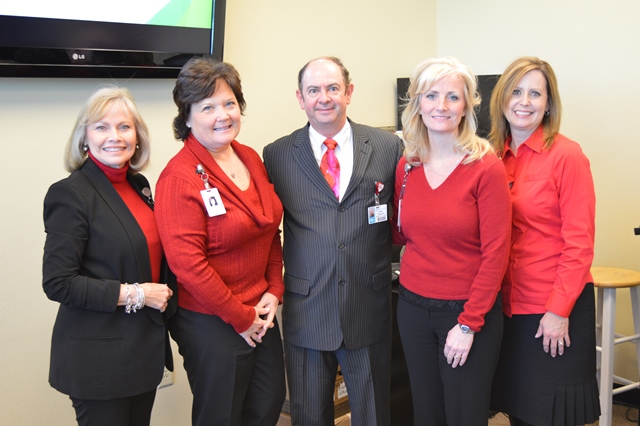
ROCKWALL, TX (Feb. 23, 2015) Texas Health Presbyterian Hospital Rockwall presented area residents with seven simple steps for taking better care of your heart during its annual Healthy Hearts Rock luncheon on Thursday, Feb. 19.
Texas Health Presbyterian Hospital Rockwall welcomed Chief of Cardiology at Texas Health Dallas, Dr. Jorge Cheirif, MD, as the guest speaker of the event, who presented attendees with the benefits of keeping the heart in good shape and how those benefits can lead to a longer, healthier life.
Cheirif went over the seven factors that can greatly impact the health of the heart, including smoking status; Body Mass Index (BMI, a measure of body fat); physical activity; healthy diet score (in the context of an overall healthy eating pattern and energy balance); total cholesterol; blood pressure; and fasting plasma glucose levels.
Exercise, Cheirif said, is a lot more important when it comes to a healthy heart than most people might realize.
“Exercise is totally underrated,” Cheirif said. “Believe me when I say that just going from three to 10 minutes of aerobic exercise per day can extend your lifespan by about five years. This is so huge; you have to get into the habit of walking every single day.”
According to Cheirif, even doing regular activities such as gardening or walking at the mall – if done on a consistent basis – can positively affect your mortality and increase your lifespan.
When it comes to heart disease and who’s at risk, Cheirif said that your family’s medical history of course plays a big role, but that even if your family has no history of heart disease and your cholesterol and blood pressure levels are normal, you can still be at risk for heart problems such as cardiac arrest.
One noteworthy fact that Cheirif explained is that heart rate – how many times per minute the heart beats – also impacts the longevity of one’s life. For example, the Blue Whale – the largest mammal on earth – has a mere average heart rate of 20 BPM or 20 beats per minute. The Blue Whale has an estimated lifespan between 80-90 years and is one of the oldest living marine mammals known to inhibit the sea.
A mouse’s heart, on the other hand, beats an estimated 250 times in one minute. Their average life expectancy? Only a few months.
“The bottom line is, the lower your heart rate, the longer your longevity,” Cheirif said.
Born and raised in Mexico City, Dr. Cheirif obtained his medical degree from the National University of Mexico and completed his internship and residency in internal medicine at Baylor College of Medicine in Houston.
Cheirif is the director of the non-invasive cardiology lab, medical director of the Hispanic Initiative, and immediate past president and director of the Behavioral Event Review Committee (BERC) at Texas Health Presbyterian Hospital Dallas. He also serves as chair of the heart & vascular accreditation case manager (HV-ACM) strategy committee. He is board-certified in cardiovascular diseases and internal medicine, focusing on consultative cardiology, echocardiography, CT angiography and cardiac catheterization.
Story and photo Austin Wells, Blue Ribbon News reporter.
To share your good news and events, email editor@BlueRibbonNews.com.
Please click here to LIKE our Facebook page, so we can reach more people with good news like this!






